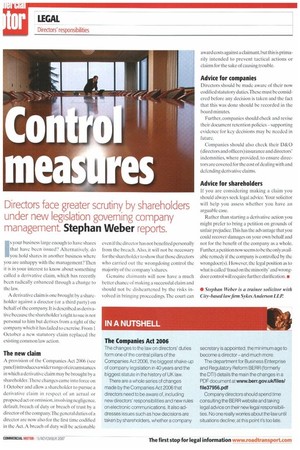Directors face greater scrutiny by shareholders under new legislation governing company
Page 40

If you've noticed an error in this article please click here to report it so we can fix it.
management. Stephan Weber reports.
Is your business large enough to have shares that have been issued? Alternatively, do you hold shares in another business where you are unhappy with the management? Then it is in your interest to know about something called a derivative claim, which has recently been radically enhanced through a change to the law.
A derivative claim is one brought by a shareholder against a director (or a third party) on behalf of the company. It is described as derivative because the shareholder's right to sue is not personal to him but derives from a right of the company which it has failed to exercise. From 1 October a new statutory claim replaced the existing common law action.
The new claim
A provision of the Companies Act 2006 (see panel) introduces a widerrange ofeircumstances in which a derivative claim maybe brought by a shareholder.These changes came into force on 1 October and allow a shareholder to pursue a derivative claim in respect of an actual or proposed act or omission, involving negligence, default, breach of duty or breach of trust by a director of the company:111e general duties of a director are now also for the first time codified in the Act. A breach of duty will be actionable even if the director has not benefited personally from the breach. Also, it will not be necessary for the shareholder to show that those directors who carried out the wrongdoing control the majority of the company's shares.
Genuine claimants will now have a much better chance of making a successful claim and should not be disheartened by the risks involved in bringing proceedings. The court can award costs against a claimant, but this is primarily intended to prevent tactical actions or claims for the sake of causing trouble.
Advice for companies
Directors should be made aware of their now codified statutory duties.These must be considered before any decision is taken and the fact that this was done should be recorded in the board minutes.
Further, companies should check and revise their document retention policies — supporting evidence for key decisions may be needed in future.
Companies should also check their D&O (directors and officers) insurance and directors' indemnities, where provided, to ensure directors are covered for the cost of dealing with and defending derivative claims.
Advice for shareholders
If you are considering making a claim you should always seek legal advice. Your solicitor will help you assess whether you have an arguable case.
Rather than starting a derivative action you might prefer to bring a petition on grounds of unfair prejudice. This has the advantage that you could recover damages on your own behalf and not for the benefit of the company as a whole. Further,a petition now seems to be the only available remedy if the company is controlled by the wrongdoer(s). However, the legal position as to what is called 'fraud on the minority' and wrongdoer control will require further clarification..


























































































































































































